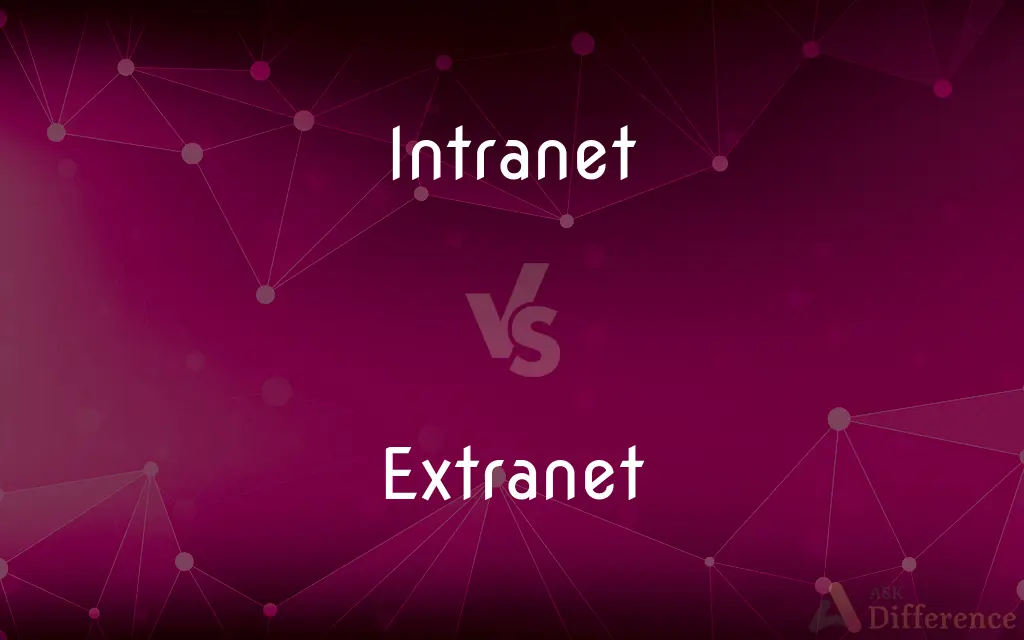Intranet vs. Extranet — What's the Difference?
Edited by Tayyaba Rehman — By Fiza Rafique — Updated on November 1, 2023
Intranet is a private network for internal use, Extranet extends it to trusted external users.

Difference Between Intranet and Extranet
Table of Contents
ADVERTISEMENT
Key Differences
Intranets are restricted networks used internally within an organization, whereas extranets are extensions of the intranet accessible to authorized external users. An intranet serves as a private hub of information and resources for employees, fostering internal communication and collaboration. An extranet, while still controlled by the organization, allows specific external stakeholders, like partners or clients, to use certain parts of the intranet.
While an intranet is designed for exclusive use by a company's employees, an extranet allows for controlled access outside the company. Intranets often contain sensitive data that is not meant for outside viewing, secured behind firewalls and access controls. Extranets provide a secure but limited window into the intranet, permitting external parties to collaborate on projects or access specific databases.
An intranet is usually accessed through a local network or VPN, providing tools like internal messaging, document management, and company-specific applications. An extranet might use similar tools but is accessed through secure, authenticated entry points on the internet, allowing users to collaborate across organizational boundaries.
Security measures for intranets typically focus on protecting against external threats, maintaining an environment secure from outside entities. Extranets must balance this security while also providing access to pre-approved external users, often employing additional layers of security such as multi-factor authentication.
In terms of maintenance, an intranet requires internal IT staff to manage and update the platform, tailoring it to the needs of the organization. The extranet's maintenance is more complex as it involves ensuring that external users can access necessary services without compromising security or performance.
ADVERTISEMENT
Comparison Chart
Access
Internal employees only.
External stakeholders with permission.
Purpose
Internal communication and collaboration.
Collaboration with clients, vendors, or partners.
Connectivity
Typically a local network or VPN.
Accessible over the internet with security.
Security
High; internal use minimizes exposure.
Extra layers, like MFA for external access.
Content
Company-specific, confidential.
Selected company data shared externally.
Compare with Definitions
Intranet
An intranet is a private network within an organization.
Our company’s intranet has all the HR forms and policies.
Extranet
An extranet provides a secure communication channel between a company and external parties.
The extranet has been updated with the new compliance documents.
Intranet
Intranets are used to share company information and computing resources with employees.
I’ll schedule the meeting through the intranet’s calendar tool.
Extranet
Extranets extend certain intranet features to external users.
Clients can track their orders through our extranet.
Intranet
An intranet utilizes web technologies to facilitate secure internal communications.
Please check the intranet for the latest sales figures.
Extranet
An extranet is a controlled private network that allows access to partners.
We shared the project timeline with our partners via the extranet.
Intranet
Intranets serve as a central platform for employee services and workflows.
The intranet hosts our project management system.
Extranet
Extranets are often used to collaborate on joint ventures across company boundaries.
The contractors uploaded their progress reports to the extranet.
Intranet
Intranets may operate as an organization's internal corporate culture portal.
The intranet features a forum for employee announcements.
Extranet
Extranets require specific permissions and authentication for access.
Only vendors with verified credentials can access our extranet.
Intranet
An intranet is a computer network for sharing information, collaboration tools, operational systems, and other computing services within an organization, usually to the exclusion of access by outsiders. The term is used in contrast to public networks, such as the Internet, but uses most of the same technology based on the Internet Protocol Suite.A company-wide intranet can constitute an important focal point of internal communication and collaboration, and provide a single starting point to access internal and external resources.
Extranet
An extranet is a controlled private network that allows access to partners, vendors and suppliers or an authorized set of customers – normally to a subset of the information accessible from an organization's intranet. An extranet is similar to a DMZ in that it provides access to needed services for authorized parties, without granting access to an organization's entire network.
Intranet
A privately maintained computer network that can be accessed only by authorized persons, especially members or employees of the organization that owns it.
Extranet
An extension of an institution's intranet, especially over the World Wide Web, enabling communication between the institution and people it deals with, often by providing limited access to its intranet.
Intranet
(computing) A private computer network, typically one that uses the protocols of the Internet.
Extranet
(computing) A private computer network that uses Internet protocols and can be accessed by authorized individuals via the Internet.
Intranet
A restricted computer network; a private network created using World Wide Web software
Common Curiosities
Can intranets be accessed remotely?
Yes, employees can access intranets remotely via VPN or other secure methods.
How do intranets and extranets differ in access?
Intranets are limited to employees, extranets are accessible to external users with permissions.
What is an intranet?
An intranet is a private, secure network used by employees within an organization.
What is an extranet?
An extranet is an extension of an intranet that is available to authorized external users.
Who uses an intranet?
Intranets are primarily used by the internal staff of an organization.
What is a common feature of an extranet?
Features often include document sharing, project management tools, and order tracking for external users.
What is a benefit of an intranet?
A major benefit is the efficient distribution of information within a company.
Who uses an extranet?
Extranets are used by pre-approved stakeholders such as customers, partners, or suppliers.
How does an intranet support collaboration?
An intranet supports collaboration through shared workspaces, messaging, and document management.
What is a benefit of an extranet?
It improves collaboration with external users and streamlines processes like ordering and support.
Are extranets secure?
Yes, extranets use security measures like encryption and MFA to protect data.
How does an extranet support collaboration?
An extranet facilitates collaboration with external entities through shared online services and information exchange.
What is a common feature of an intranet?
Common features include internal communication tools, document storage, and HR systems.
Can extranets connect multiple organizations?
Yes, extranets can connect multiple organizations for joint initiatives and information sharing.
Do intranets and extranets replace the internet?
No, they are supplements to the internet, providing specialized, secure environments for specific user groups.
Share Your Discovery

Previous Comparison
Hologram vs. Iridescent
Next Comparison
Radial vs. AxialAuthor Spotlight
Written by
Fiza RafiqueFiza Rafique is a skilled content writer at AskDifference.com, where she meticulously refines and enhances written pieces. Drawing from her vast editorial expertise, Fiza ensures clarity, accuracy, and precision in every article. Passionate about language, she continually seeks to elevate the quality of content for readers worldwide.
Edited by
Tayyaba RehmanTayyaba Rehman is a distinguished writer, currently serving as a primary contributor to askdifference.com. As a researcher in semantics and etymology, Tayyaba's passion for the complexity of languages and their distinctions has found a perfect home on the platform. Tayyaba delves into the intricacies of language, distinguishing between commonly confused words and phrases, thereby providing clarity for readers worldwide.















































